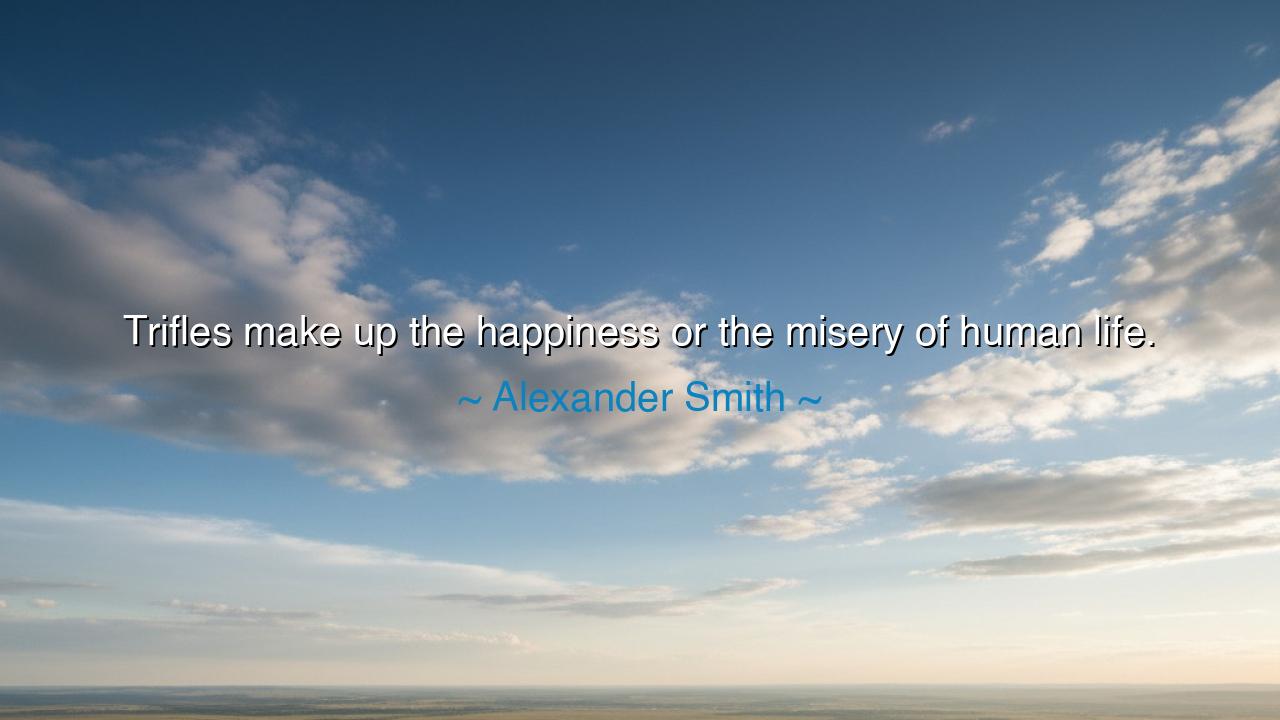
Trifles make up the happiness or the misery of human life.






In the quiet wisdom of observation, Alexander Smith once wrote: “Trifles make up the happiness or the misery of human life.” Simple though these words appear, they carry the weight of ages. They remind us that life, in its vast and trembling beauty, is not built upon grand events alone, but upon the small, invisible threads that weave our days together. The world measures greatness by monuments and victories, but the heart measures life by moments — by the glance, the word, the touch, the kindness, or the neglect that marks each dawn and dusk. Thus, the trifles, those tiny deeds and choices that seem to vanish with the wind, are in truth the architects of our joy or sorrow.
To the ancients, this truth was well known. The philosophers of Greece spoke often of moderation, of mindfulness in daily living. Aristotle taught that virtue lies not in rare heroics, but in the habits we form, the small acts we repeat until they shape the soul. Alexander Smith, a poet of the nineteenth century, echoed that same eternal insight — that happiness is not a thunderclap but a steady flame, kindled and sustained by countless small sparks. It is the morning greeting, the patience shown to a friend, the gratitude expressed for a meal, the quiet thought before sleep. Each one may seem a trifle, yet together they form the melody of a life well lived.
The power of trifles can be seen in every human story. Consider the life of Mahatma Gandhi, who changed the destiny of nations through acts so small they might have gone unnoticed. He began not with armies or wealth, but with a spinning wheel and a vow of peace. His strength was built upon simplicity — daily discipline, humble meals, silent reflection, and unwavering kindness. These small choices became the foundation of his greatness. Through them, he proved that the smallest action, when guided by purpose, can move the tides of history. So too in our ordinary lives, it is not the rare triumphs that define us, but the steady rhythm of goodness that we practice each day.
And yet, these same trifles can also breed misery, if neglected or poisoned by bitterness. A careless word can wound the spirit; a day of ingratitude can wither joy. A habit of complaint, though seemingly small, can darken an entire lifetime. The heart does not break all at once — it erodes slowly, through neglected kindness, forgotten courtesies, and unspoken love. Just as water carves stone through patience, so too can indifference carve sorrow into the soul. It is in the smallest cracks of daily life that despair begins to dwell.
Smith’s wisdom, then, is not only a reflection but a warning. He reminds us that our fate does not rest in the distant future, but in the present moment, in the little things we do and say now. To seek happiness, one must learn to see the sacred in the ordinary — to pause long enough to notice the beauty in a sunrise, the laughter of a child, the warmth of a familiar voice. The art of living well lies in reverence for the seemingly insignificant, for it is from these that meaning is born.
Let this teaching be your guide: do not wait for greatness to find you, but look for happiness in the small corners of each day. Speak gently, listen deeply, give thanks often. Plant kindness in the smallest fields — a smile, a word of encouragement, a moment of patience — for such seeds grow into forests of peace. When hardship comes, remember that even misery, too, is made of trifles — of fears fed by small doubts, of hopes starved by small neglects. Change the small, and the great will follow.
Thus, the wisdom of Alexander Smith stands as a mirror to the human heart: that we are shaped not by our grandest dreams, but by our daily choices. A single gesture of love can alter the course of a day; a single act of cruelty can shadow a year. Life is not measured in years, but in moments — and those moments, fleeting and fragile, are the building blocks of eternity.
So, the teaching concludes: guard your trifles well, for they are not small at all. They are the atoms of destiny, the quiet architects of joy and sorrow. To master them is to master life itself. And when you do, you will find that true happiness was never far away — it was waiting all along, hidden in the smallest acts of a mindful heart.






AAdministratorAdministrator
Welcome, honored guests. Please leave a comment, we will respond soon